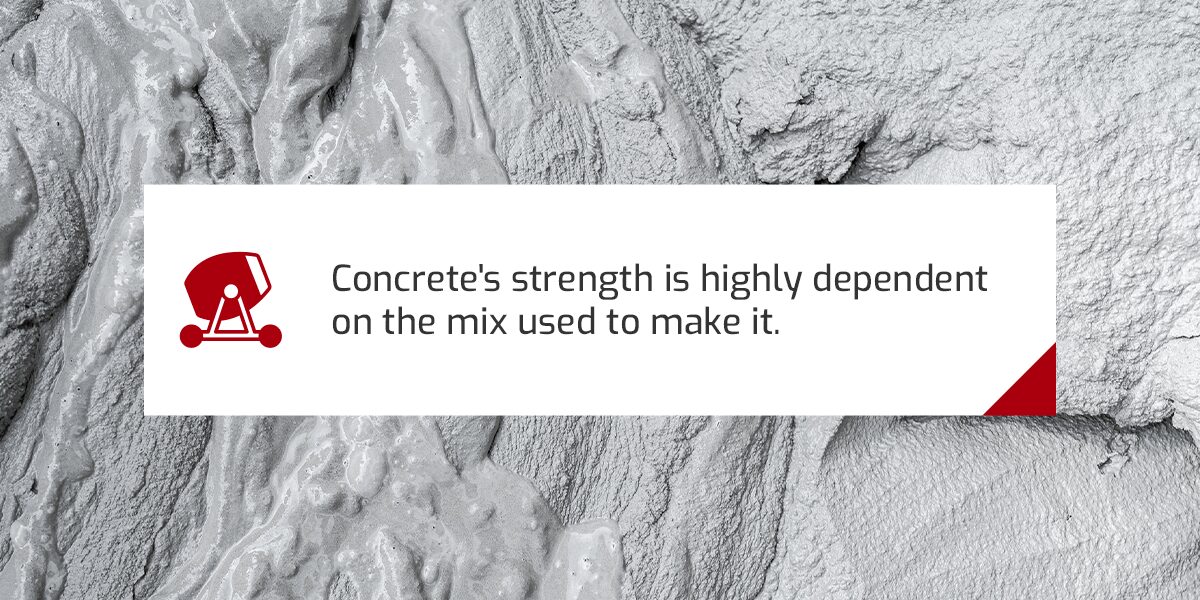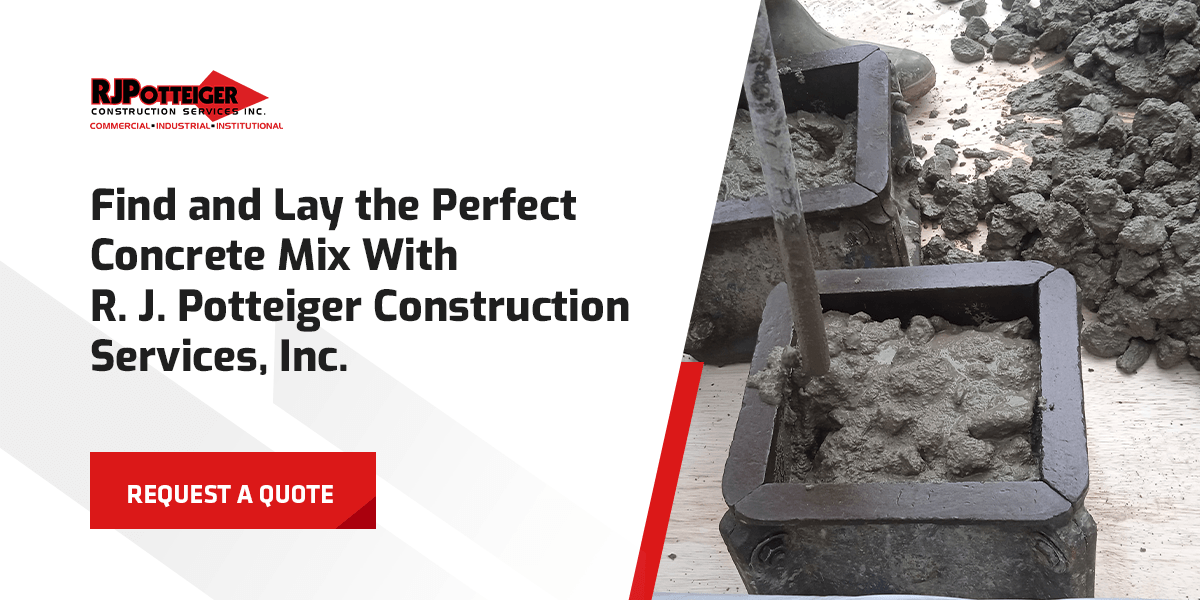Understanding Concrete Strength: PSI Ratings Explained
Concrete is one of the most important building materials — but not all concrete is created equally. Both its mix and compressive strength can vary widely, which means it’s vital to understand your concrete mix strength before pouring it. Otherwise, it may not be able to withstand loads.
This is where concrete PSI rating comes in. Pounds per square inch (PSI) refers to the pounds of force per square inch the concrete can withstand, which is distinct from concrete pressure. In this article, we explore the factors that contribute to concrete PSI rating so that you can select the right concrete for your application.
What Is PSI in Concrete?
PSI is an important tool for measuring the exertion of force. In concrete, it’s most commonly used to measure compressive strength. PSI ratings for concrete are determined through standardized ASTM C39 testing procedures, which test cylindrical specimens of concrete under controlled conditions to determine how much force can act on the surface. In these tests, the concrete cores must meet specific criteria to pass.
While concrete’s PSI rating specifically refers to compressive strength, you should also consider the other types of force concrete is exposed to — shear stress and tensile stress. The former refers to the application of perpendicular force. The latter is the opposite of compressive force. Rather than pushing down on the surface, tensile stress has to do with forces pulling away from it.
Concrete tends to handle compressive and shear forces well, but it’s not as resilient against tensile forces. That said, concrete’s strength is highly dependent on the mix used to make it.

Factors Influencing Concrete Strength and PSI Rating
Many factors impact concrete’s strength and PSI rating. Making concrete stronger requires a few different approaches:
- Adjusting the water-cement ratio: Water and cement are two of the main ingredients in concrete, and the water-cement ratio is one of the most critical factors in determining concrete strength. Water keeps the concrete malleable, but it also reduces its strength. Mixes with less water will dry faster, but they’ll be stronger as a result.
- Investing in higher-grade cement: The quality of the cement you’re using impacts its strength. Fineness, ingredient ratios and chemical composition all matter when laying cement, so it’s important to evaluate these qualities in a mix you’re considering.
- Using larger aggregates: This is the third major ingredient of concrete. As a mix of sand, stone and gravel, aggregates support the concrete around them and create its distinctive texture. Larger aggregates can increase this support and strengthen the concrete as a whole.
- Mixing the concrete properly: Mixers are a vital part of laying concrete, but they need to be used carefully. Mix the concrete too little, and its ingredients won’t be balanced across the mixture. Mix it too much, and water might evaporate from the mix entirely.
- Curing the concrete properly: Curing refers to the process of keeping the concrete hydrated as it dries. This process deters shrinking, damage and overall weakness. As such, it’s important to follow standard curing protocols to keep the concrete intact.
In many situations, it may not be necessary to have the strongest concrete available. Using proper mixing and curing techniques is important for all concretes, however, even if you aren’t prioritizing strength.
Selecting and Testing the Right PSI Concrete for Your Needs
Before you begin laying your concrete, you need to know what it’s going up against. While 2,500 PSI is a high enough rating for a sidewalk, concrete foundations for parking lots and building structures must be stronger. If weaker concrete is used, it’ll crack and break, requiring expensive repairs and causing safety issues.
As a result, you need to know what different PSI ratings are used for. Generally, 2,500 PSI is the baseline, but some blends of concrete can withstand over 10,000 PSI. To figure out the proper PSI rating for your needs, consider the concrete PSI chart below.
| Concrete Application | Concrete PSI |
|---|---|
| Residential sidewalks, patios and walkways | 2,500-3,000 |
| Residential basement and foundation walls | 2,500-3,000 |
| Residential driveways and garage floors | 3,000-4,000 |
| Foundation footings and slabs | 3,500-4,000 |
| Commercial warehouse and factory floors | 4,000-5,000 |
| Commercial pavements and loading docks | 4,000-5,000 |
| Reinforced beams, columns, slabs and walls | 3,000-7,000 |
| Bridges, dams, highways and overpasses | 5,000-7,000 or higher |
| High-rise buildings | 7,500-10,000 or higher |
| High-rise building columns | 10,000-15,000 |
With an understanding of what PSI concrete you should use for a driveway and other popular applications, it is important to factor the weather climate which may require a higher strength mix. Therefore, it is important to communicate your specific needs with your concrete supplier.
Keep in mind that the concrete should be periodically tested to evaluate its strength as it cures. These tests are typically conducted 28 days after the mix is poured, though they can happen at different intervals depending on the project. Your concrete supplier should assist you with conducting these tests to make sure they’re carried out with accuracy and precision. If all goes well, these tests will give you confidence that the concrete can live up to the stress it’s going to be placed under.
High-Strength Concrete Applications
If you’re looking for the strongest concrete mix available, ultra-high performance concrete (UHPC) may be worth exploring. Integrated fibers — which vary in composition from polyester to steel — are spread throughout the mix to increase strength, much like traditional aggregates.
These fibers make UHPC more resistant to compressive, shear and tensile forces, extending its life and increasing its PSI rating. UHPC even offers heightened resistance to freeze/thaw cycles, which can lead to fewer cracks and a longer lifespan. This type of concrete is especially useful for complex, load-bearing constructions like high rises, bridges and roads.
Find and Lay the Perfect Concrete Mix With R. J. Potteiger Construction Services, Inc.
The right concrete partner can help you select and lay a suitable concrete mix for your applications. R. J. Potteiger Construction Services, Inc. has been serving clients for over 30 years with efficiency, professionalism and quality workmanship.
Our staff works diligently to provide clients with solutions tailored to their needs, whether residential, commercial or industrial. From driveways to equipment pads and various concrete structures in between, R. J. Potteiger Construction Services, Inc. has you covered.
To learn more about our concrete services, fill out our contact form.




